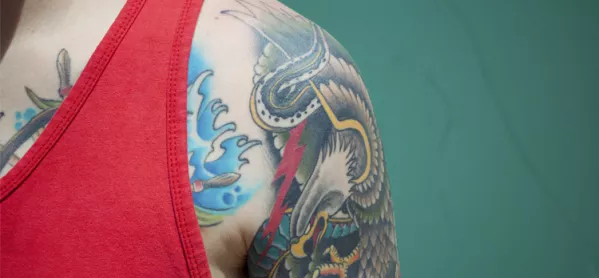On Tuesday, I get tattooed for the seventh time. Some would say it’s the teenage rebellion I never quite grew out of. But then, at 32 and with a similarly tattooed spouse (and a mother who I’m convinced will get her first by the end of the summer) I’ve not really got anyone to rebel from.
So, perhaps it’s a rebellion not from “who” but “what”? Like most schools, our policy is for staff and students to have no visible tattoos. Could this be my attempt to distance myself from the seemingly sterile confines of my school identity? Or to mark myself out as some kind of educational radical or firebrand? No, not one bit. I fully support any school policy that puts professionalism at its heart. All my tattoos will remain happily hidden on my return to work in September.
Status symbol
From the moment I qualified as a teacher, I have valued professional status: I attend conferences on Saturdays and read books to improve my subject knowledge; I work hard to keep myself up to date and to get a little bit better at what I do every day. For me, donning professional dress is an extension of the pride I feel for my profession. In a political climate that has sought to devalue the professional status of teachers and to denigrate the job I hold so dear, in my opinion, any outward symbol of status and respect is to be embraced rather than quibbled over.
But it would be a lie to deny that the moment the school bell goes at the end of the summer term there isn’t a sense of release. This year, that exhilaration led me to a bottle of purple hair dye. Any of my colleagues who’d have seen me two days after the end of term would’ve been left wondering quite what had happened to me at the hairdressers and whether I wouldn’t be best placed to sue. And this leaves me with a dilemma. For there is clearly not one Caroline, but two.
Perhaps for me these concerns have been exacerbated by a sense that, even from early adolescence, defining my identity - exactly who I am - was never going to be completely straightforward. Having skipped primary-age bonding owing to a move from the leafy confines of the Wirral to the more cosmopolitan hubbub of Derby aged 11, I was always aware of being different. Be it gender, sexuality, social class or musical taste, identifying with any given social group didn’t feel particularly easy. As a result, I’ve often said that one of my motivating factors for remaining in schools is a desire to help students who see themselves as outsiders feel, well, less outside.
“Things do get better” will always be my persistent message. Find one or two good friends and they will see you through. Or as the wonderful
Kathleen Hanna puts it: “Keep on living”.
As I grew older, I began to realise that there was maybe never going to be a definitive answer to the question of identity, at least not for me. It was apposite that my undergraduate dissertation was sub-titled (somewhat pretentiously) “The subject always asks: what am I?”. And I’ve come to realise that the question of identity is one that I will be continually asking, over and over again, as I change and the world around me changes.
Striving for authenticity
It is a question that is yet again at the forefront of my mind this summer as I take my first steps into senior
leadership. I am keenly aware that as a school leader authenticity, and the practice of being true to your core values, is key to your effectiveness. And yet, from the outside, it would appear that with my hidden tattoos and purple hair at school the image I present is utterly inauthentic. So, how do I reconcile the unprofessional me with my desire to be seen as both authentic and professional at work?
Well, like my core values, professionalism for me is unchanging. The way I present myself, see myself, and am seen by others - my identity - may change. But what I believe, work for, and the way I work, will not.
This stance was tested last week at a local music festival when I bumped into one of my current GCSE students. My violet hair was glowing bright, my tattoos were on display, I was sporting a shirt with the word “Poison” printed all over it, and at least one pint of cider had been consumed. My initial reaction was to hide behind the shirt of my good friend who was laughing loudly at my discomfort at having been “caught”. But then I looked again at the wonderful, hardworking, girl I teach and thought “Why on earth shouldn’t I show her that I like the same music she does? That I’m a little bit different, too?” If one of my core purposes is to make outsiders feel “less outside” then it doesn’t matter whether we’re in a field or a classroom; to be authentic is to “walk the talk” and say a warm hello. So that’s what I did.
I have no doubt that that the young woman in question will go on to achieve a grade 8. I can only hope that even though she may not yet have a strong sense of who she is, like me, she will have a strong sense of the professional she can be.
Caroline Spalding is head of English at Tupton Hall School in Derbyshire and tweets as @HeadofEnglish. This article was originally published on her blog Teacher’s Notes


